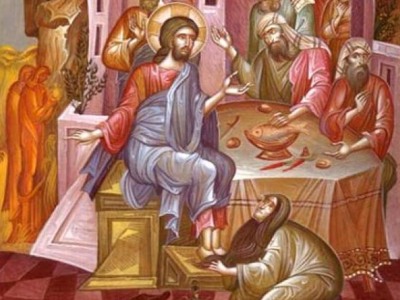On Holy Wednesday, the Church commemorates the sinful woman who anointed Jesus before his crucifixion.
The Divine Liturgy of the Presanctified Gifts takes place in the morning. Several of the troparia, which had been chanted last night during the Bridegroom Orthros of Holy Wednesday, are also chanted during the Vespers service, which accompanies the Divine Liturgy of Presanctified Gifts, and the Gospel’s pericope is read which tells of the woman who washed Christ’s feet in the house of Simon the Leper.
While the woman, who regrets her actions, expresses her remorse and returns to Jesus Christ, Judas prepares for the betrayal of his Master. While the humiliated sinful woman saw the presence of the Savior Christ, his disciple, despite being his follower for three years, plans to make a bargain in order to betray his Master. Judas wants thirty pieces of silver in order to betray his Master.
The fast of Wednesday throughout the year, except for the weeks when we celebrate joyful events, such as Christmas, Easter, Pentecost, is a practice for the faithful to remember the betrayal of betrayal of our Lord for “thirty pieces of silver” and the decision to sentence Jesus to death.
The Orthros of Holy Thursday, that is, the ritual of the Washing of Feet, during which the Jesus Christ washed the feet of his disciples, takes place this afternoon, along with the Holy Mystery of Holy Unction that is offered for the healing of soul and body and for forgiveness of sins of the faithful. In addition, due to an emergency, the priest is called to perform it in case of physical or mental illness.
The sacramental life of the Church provides the faithful with all the necessary supplies to face the difficulties and trials, regardless of their previous life or any of their decisions and actions. Jesus Christ’s behavior towards His two disciples, Judas Iscariot and Peter, is an eloquent proof of His forgiveness and love. Judas, after the betrayal, due to selfishness and cowardice, does not seek repentance from his Master. And Peter, after his denial of Jesus, is sure of the unwavering love of Christ and, repentant, is restored to the apostolic office. It is up to each individual to choose freely, to decide and to move towards darkness or light.
Source: Church of Cyprus
